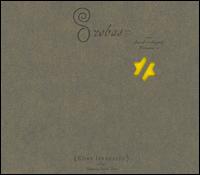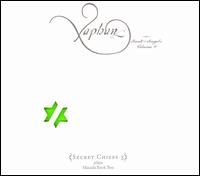
John Zorn is an American composer, conductor, saxophonist, arranger and producer who "deliberately resists category". His avant-garde and experimental approaches to composition and improvisation are inclusive of jazz, rock, hardcore, classical, contemporary, surf, metal, soundtrack, ambient, and world music. In 2013, Down Beat described Zorn as "one of our most important composers" and in 2020 Rolling Stone noted that "[alt]hough Zorn has operated almost entirely outside the mainstream, he's gradually asserted himself as one of the most influential musicians of our time".

Masada is a musical group with rotating personnel led by American saxophonist and composer John Zorn since the early 1990s.

The Circle Maker is a double album by John Zorn featuring Zorn's Masada compositions performed by the Masada String Trio and the Bar Kokhba Sextet which was released in 1998 on the Tzadik label.

John Zorn's Cobra: Live at the Knitting Factory is an album of a performance of John Zorn's improvisational game piece, Cobra, performed at the Knitting Factory in 1992. The album resembles the missing link between John Zorn's work with Masada and Naked City. It also had a major impact on the electronic scene of New York.

Music for Children is the first release in John Zorn's Music Romance Series and features three Naked City compositions performed by Zorn with the band Prelapse; a 20-minute composition for wind machines and controlled feedback systems dedicated to Edgar Varese, and a classical chamber music piece for violin, percussion and piano performed by the Abel-Steinberg-Winant Trio framed by a poly-rhythmic etude for percussion and celeste and a lullaby for music box.

Godard/Spillane is a compilation album by American composer and saxophonist/multi-instrumentalist John Zorn consisting of music created through Zorn's file-card compositional process. The composition "Godard", a tribute to French film-maker Jean-Luc Godard whose jump-cut technique inspired Zorn's compositional approach, on the French tribute album Jean-Luc Godard|Godard ça vous chante? in 1986 issued by the French Nato label. "Spillane" was first released on Zorn's Nonesuch Records album Spillane in 1987, and "Blues Noël" was first released on the compilation album Joyeux Noël - Merry Christmas Everybody! on Nato in 1987.

Filmworks III: 1990–1995 features the scores for film and advertisements by John Zorn. The album was originally released on the Japanese labels Evva in 1995 and Toys Factory in 1996 and subsequently re-released on Zorn's own label, Tzadik Records, in 1997. It features the music that Zorn wrote and recorded for Thieves Quartet (1993), directed by Joe Chappelle, which was performed by the group that would become Masada; nine cues for Kiriko Kubo's Music For Tsunta (1988); eleven tracks for Hollywood Hotel (1994), directed by Mei-Juin Chen; and thirty-two pieces for advertisements by Wieden & Kennedy.

Filmworks IV: S/M + More features film scores by John Zorn. The album was released in Japan on Eva Records in 1996 and on Zorn's own label, Tzadik Records, in 1997. It features the music that Zorn wrote and recorded for Maria Beatty's The Elegant Spanking, Beatty and M.M. Serra's A Lot of Fun for the Evil One, "Credits Included" written for the film of the same name directed by Jalal Toufic and "Maogai," written for a piano scene in a film by Hiroki Ryuichi.

Filmworks VI: 1996 features three scores for film by John Zorn. The album was released on Zorn's own label, Tzadik Records, in 1996. It features the music that Zorn wrote and recorded for Anton, Mailman (1996), a short film directed by Dina Waxman that was never completed due to loss of funding in its final stages, Mechanics of the Brain (1996) directed by Henry Hills and The Black Glove (1996), which was directed by, and starred, Maria Beatty.

Filmworks VIII: 1997 features two scores for film by John Zorn released on Zorn's own label, Tzadik Records, in 1998. It features the music that Zorn wrote and recorded for The Port of Last Resort (1998), a documentary directed by Joan Grossman and Paul Rosdy examining the experiences of Jewish refugees in Shanghai and Latin Boys Go to Hell (1997) which was directed by Ela Troyano.

50th Birthday Celebration Volume 4 is a live album by Electric Masada documenting their performance at Tonic in September 2003 as part of John Zorn's month-long 50th Birthday Celebration.

Masada Anniversary Edition Vol. 5: Masada Rock is the fifth and final album in a series of five releases celebrating the 10th anniversary of John Zorn's Masada songbook project. It features 10 Masada songs performed by Jon Madof's Rashanim trio with Shanir Ezra Blumenkranz on bass and Mathias Kunzli on drums in addition to Madof's guitar with guest appearances from Marc Ribot on two tracks. It was released in 2005 on Zorn's Tzadik Records as part of the Radical Jewish Culture Series.

50th Birthday Celebration Volume 11 is a triple live album by the Bar Kokhba Sextet documenting their performance at Tonic in September 2003 as part of John Zorn's month-long 50th Birthday Celebration.

Redbird is an album of contemporary classical music by American composer and saxophonist/multi-instrumentalist John Zorn consisting of two tribute compositions for artist Agnes Martin.

Orobas: Book of Angels Volume 4 is an album by Koby Israelite performing compositions from John Zorn's second Masada book, "The Book of Angels".

Xaphan: Book of Angels Volume 9 is an album by the Secret Chiefs 3 performing compositions from John Zorn's second Masada book, "The Book of Angels". It is the fifth studio album to be released by the Secret Chiefs 3. As with the other volumes of the Book of Angels series, the titles of the songs are characters from Jewish and Christian mythology. The title of the album, Xaphan refers to one of the fallen angels who rebelled with Satan and set the Heaven on fire.

Masada Anniversary Edition Volume 3: The Unknown Masada is the third album in a series of five releases celebrating the 10th anniversary of John Zorn's Masada songbook project. It features twelve previously unreleased Masada compositions performed by Erik Friedlander's Quake (1), Rashanim (2), Dave Douglas (3), Tatsuya Yoshida (4), Naftule's Dream (5), Jamie Saft (6), Zahava Seewald (7), Koby Israelite (8), Julian Kytasty (9); Fantômas (10), Wadada Leo Smith and Ikue Mori (11), and Eyvind Kang (12).

Ipos: Book of Angels Volume 14 is an album by the Dreamers performing compositions from John Zorn's second Masada book, The Book of Angels.

Adramelech: Book of Angels Volume 22 is the second album by Zion80, a musical ensemble led by guitarist Jon Madof, which was released in 2014 on John Zorn's Tzadik Records. It is part of the Zorn's Book of Angels Series, a songbook of Zorn compositions performed by a wide range of performers.

Theater of Mineral NADEs is an album by the violinist/multi-instrumentalist Eyvind Kang, released in 1998 on John Zorn's Tzadik Records as part of the Composer Series.




















